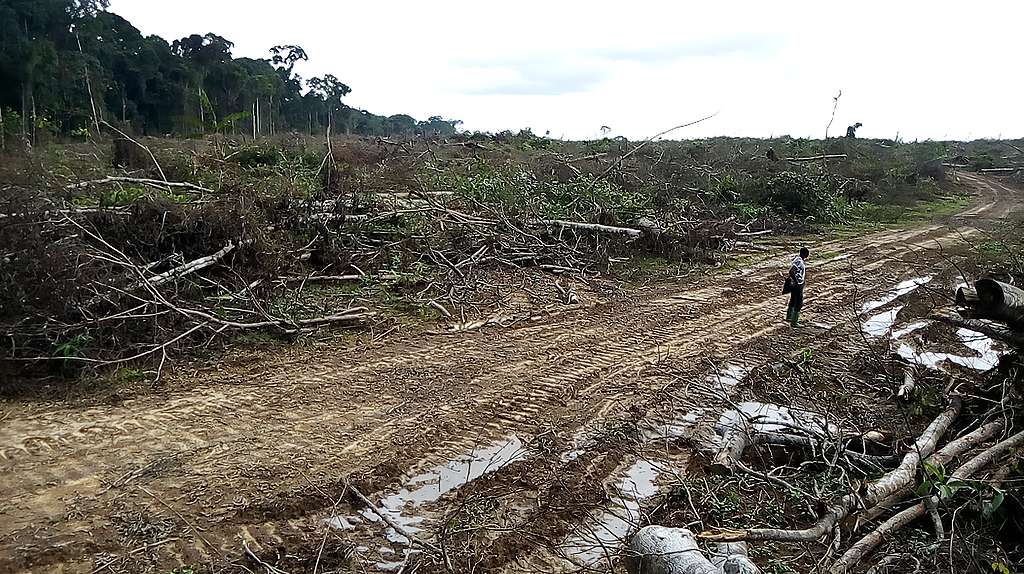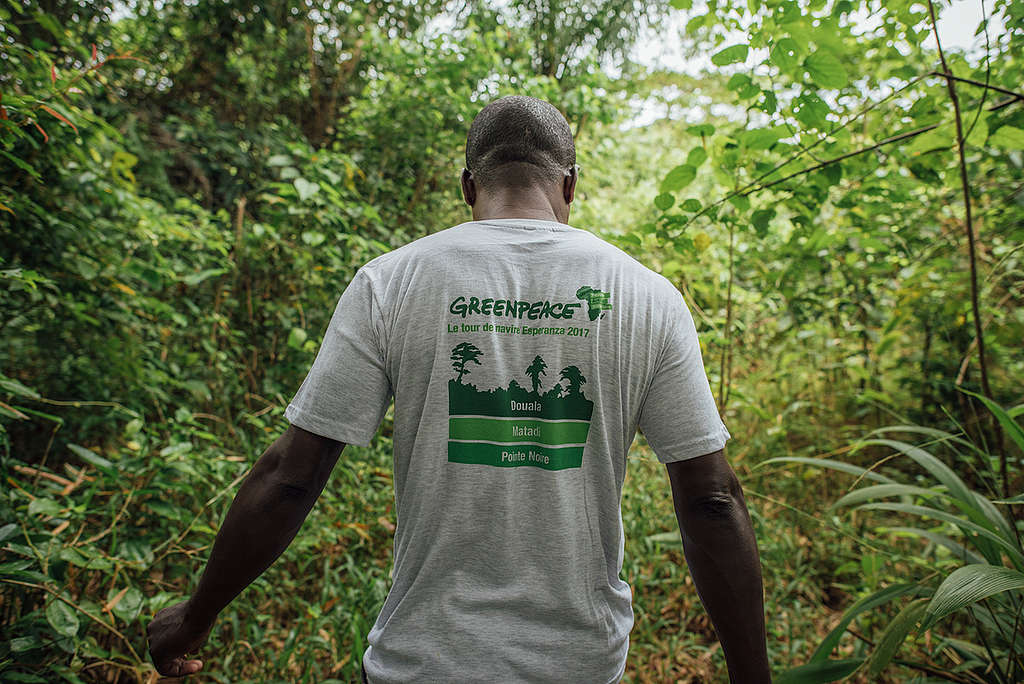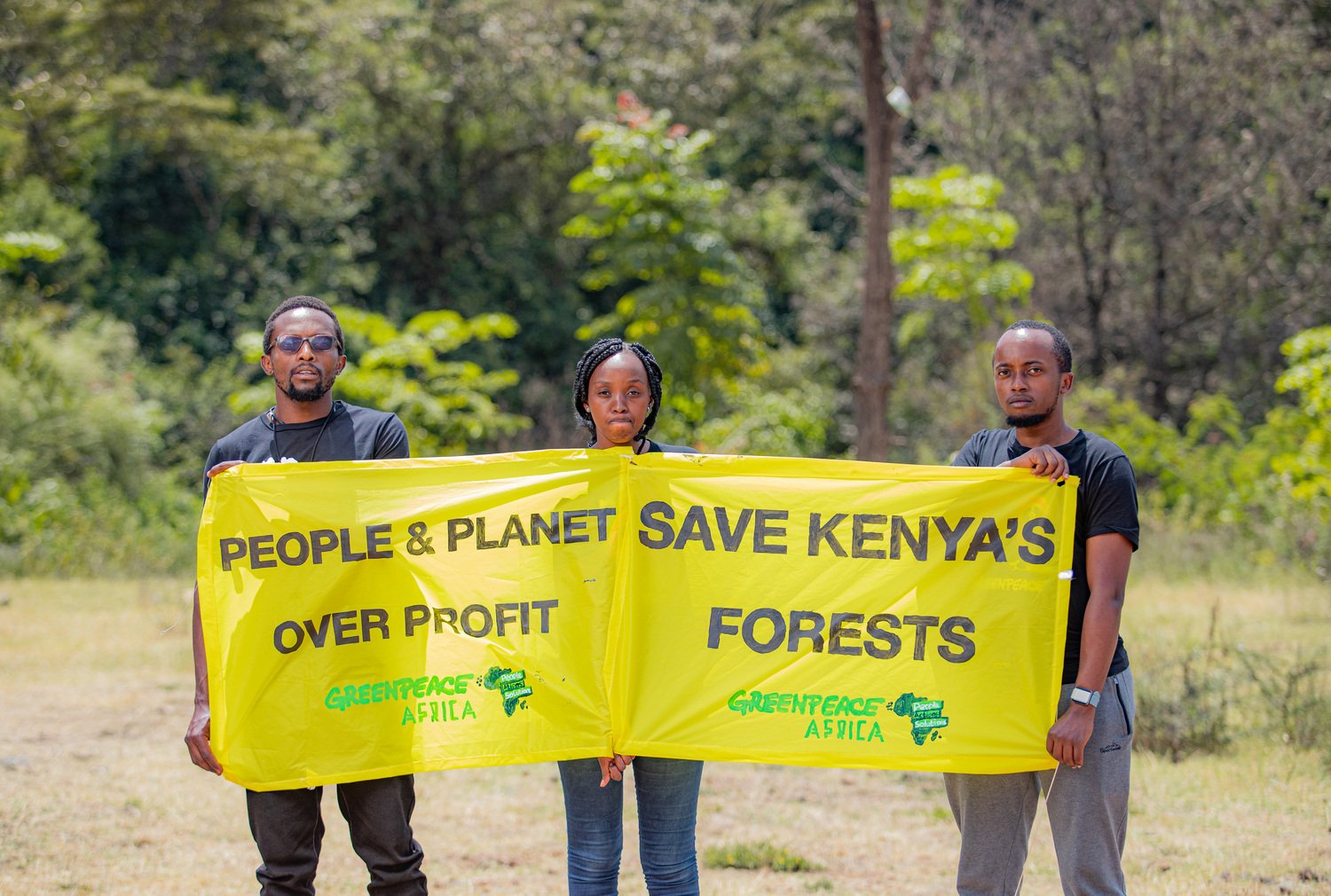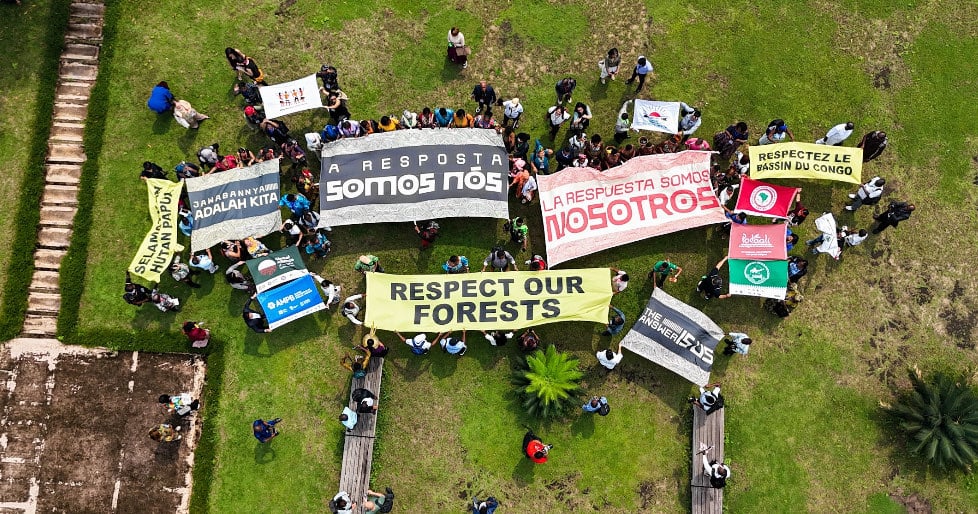Press Release
Yaounde, 28 September 2020 – Illegal clear-cutting of ancestral lands of the Indigenous Bagyeli people has begun in a biodiversity hotspot in coastal Cameroon. The land grab for a palm oil plantation about seven times the size of Dakar is agribusiness’ most serious assault on Indigenous rights in the region in years. [1] The company began initial planting on September 12.
A Cameroonian firm, Cameroun Vert SARL (Camvert) is operating in an area inhabited by 28 local communities. The company is attempting to buy off Indigenous Bagyeli people with gifts of canned tomatoes, bags of rice, and soap. Local Bantu villagers, whose land is also under attack, complain of systematic corruption of traditional chiefs, phoney consultation and destruction of crops by foraging elephants after forest areas were cleared by Camvert bulldozers.
“The Camvert project is a case of illegality and abuse of Indigenous rights that will aggravate the climate and biodiversity crises if it goes ahead. It exposes once again the perilous myth of sustainable forest management, as well as the growing problem of conversion of forests – including logging concessions certified “sustainable” by the Forest Stewardship Council – into agribusiness plantations in Cameroon,” [2] said Greenpeace Africa Cameroon Campaign Manager, Ranèce Ndjeudja.

Camvert’s draft Environmental and Social Impact Assessment (ESIA) boasts of the prospects for settling the semi-nomadic Bagyeli: “The High Intensity of Manpower (HIM) approach will resolve the problem of unskilled labor, namely the pygmies of neighboring settlements.” [3]
The Camvert project violates both Cameroonian law and international standards. Last November, Prime Minister Joseph Dion Ngute illegally removed the Camvert zone from the “permanent” forest estate. Neither of the two preconditions for changing the legal status of the forest had been met. [4] Doing so also violated the rights of local people enshrined in Cameroonian law. [5]
On April 9, following the removal of the area from the permanent forest category, State Property Minister Henri Eyebe Ayissi approved the clearing of an initial zone of 2,500 hectares of the 60,000 hectares that Camvert is seeking to “convert” into a plantation – an area about seven times the size of Dakar. Without complying with all legal requirements, the Minister’s act was illegal. [6] Greenpeace Africa and Cameroonian NGO Green Development Advocates (GDA) are calling for an immediate and transparent investigation of the minister.
The Camvert zone borders Campo Ma’an National Park, a biodiversity hotspot. However, the company’s ESIA lacks any real assessment of its impact. [7] The 206- page document mentions chimpanzees only once, a travesty of due diligence. In addition to chimpanzees, the Campo Ma’an landscape harbours other threatened mammals such as giant pangolins, African elephants, lowland gorillas, buffalos, leopards, mandrills, as well as a rich diversity of flora.
Camvert is owned by Aboubakar al Fatih, a logger close to Cameroon’s ruling party. Another company controlled by al Fatih appears to have been associated with recently suspended plans to log Ebo forest in the Littoral Region [8].
Opponents of the Camvert project are already facing intimidation. Local media have labelled them “enemies of the Republic” and “profaners” of the “President of the Republic’s policy of Great Opportunities.” [9]
“The Camvert project must be stopped altogether and the responsible authorities be sanctioned. They’ve allowed a project to go ahead, which has violated national and international provisions and undermines communities’ access to critical non-timber forest products on their land. They are threatening the way of life of forest communities,” said Aristide Chacgom, Coordinator of GDA.
Greenpeace Africa’s Rènece Ndjeudja added: “Instead of forest destruction, the Bagyeli’s Indigenous rights and Bantu customary rights must be recognized and their voices fully heard and biodiversity protected. This can only be achieved through the implementation of inclusive and participatory land use planning. In the meantime, the Minister of State Property must be investigated and Camvert’s plans cancelled.”
ENDS
Notes:
[1] On displacement of Baka communities by Deutsche Bank-financed Halcyon Agri to make way for a rubber plantation bordering the home village of President Paul Biya and a UNESCO World Heritage Faunal Reserve – see Greenpeace, Ruinous Rubber, 2018, https://www.greenpeace.org/static/planet4-africa-stateless/2018/10/8f21a9bc-8f21a9bc-greenpeace-africa-sudcam-report-2018-1.pdf
[2] The area slated for deforestation was previously a Forest Stewardship Council (FSC)-certified logging concession, run by the local partner of Dutch multinational Wijma. After “sustainably” depleting the zone of commercially viable species, the firm – who managed to keep its FSC label for months after its South West Region concession was engulfed in civil war in 2017 – proceeded to sell it to Aboubakar al Fatih.
[3] Camvert SARL, Etude d’impact environnemental et social, November 2019 (Greenpeace translation), https://drive.google.com/file/d/1StvTDH-20J_AmLgB6oeR-J4vEWvf1OO1/view?usp=sharing
[4] No decree of public utility had been published and the firm’s final ESIA had yet to be validated. Green Development Advocates, Qualifying illegalities in the Degazzetting Process of 60,000 hectares of a forest and the attribution of a Concession for an agro-industrial project in Campo and Nyete of the Ocean Division, South Region, 2020. http://gdacameroon.org/download/320/&sa=D&ust=1599735995309000&usg=AFQjCNFKeKG61iQgFvqJYsZQF0BxdCZ6vQ See Article 9 (1-2) of the 1995 Forest law application decree.
[5] Ibid. and Article 9 (3) of the 1995 Forest law application decree
[6] Ibid. – In the absence of a Presidential decree conceding the land to Camvert, or a special Presidential derogation.
[7] Camvert SARL, Etude d’impact environnemental et social, January 2020 https://drive.google.com/file/d/14TfDap2jNHacmVQjluAhUIXerlrMZAo8/view?usp=sharing
[8] Greenpeace, Cameroon’s government just decided to massacre Ebo forest, 23 July 2020, www.greenpeace.org/africa/en/press/11700/greenpeace-africa-cameroons-government-just-decided-to-massacre-ebo-forest/
[9] Actu-Plus, “Projet Agro-industriel de Plantation et Transformation du palmier à huile à Campo et Niété: Voici les vérités cachées des accords Camvert-Collectif des ONGs de la réserve Campo-Ma’an,” 9 May 2020,
Contact:
Tal Harris, International Communications Coordinator, +221-774643195, [email protected]
Greenpeace Africa Newsdesk: [email protected]





Discussion
What about the proposed Kom National Park. It was also converted into a logging concession (UFA 09-031) at the beginning of this year. Do something about it!!
Hi, thank you for sharing this information with us. We will take a look at it. However, Greenpeace Africa can not do the work alone, this is a collective effort from each one of us. Working together we can bring change.